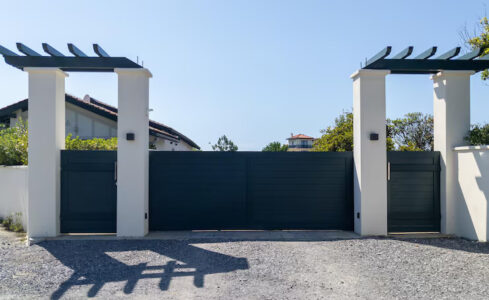In today’s modern world, convenience and safety go hand in hand. One innovation that has dramatically enhanced both is the use of automatic doors. These doors, powered by sensors and motorized systems, have become increasingly common in homes, offices, hospitals, commercial buildings, and even gated properties.
From improving mobility for people with disabilities to enhancing security and energy efficiency, automatic doors are much more than just a luxury—they are a practical necessity for many properties.
In this blog, we’ll explore how automatic doors significantly improve accessibility and security, and why investing in the right automatic door opener or automatic gate motor can be a game-changer for your property.
What Are Automatic Doors?
Automatic doors are entry systems that open and close automatically using motion detectors, sensors, remote controls, or push buttons. They come in various types such as sliding, swinging, folding, and revolving doors, as well as automated gates for residential and commercial premises.
These systems are powered by electric motors and controlled through an automatic door opener or, in the case of gates, an automatic gate motor. The technology allows for seamless entry and exit without requiring physical effort from the user.
How Automatic Doors Improve Accessibility
1. Barrier-Free Entry for All
One of the greatest advantages of automatic doors is their ability to eliminate physical barriers. Whether it’s a senior citizen with a walker, a parent with a stroller, or a person in a wheelchair, automatic doors make it easier for everyone to move freely.
By integrating an automatic door opener, even existing doors in homes or buildings can be made accessible for individuals with limited mobility.
2. Compliance with Accessibility Laws
Many countries have accessibility regulations that require public buildings to accommodate people with disabilities. Automatic doors help businesses and institutions comply with these laws, enhancing their reputation and customer inclusivity.
3. Hands-Free Operation
Especially in environments like hospitals, supermarkets, and restaurants, hands-free access is essential. People can move in and out without having to touch door handles—improving hygiene and reducing the spread of germs.
How Automatic Doors Enhance Security
1. Controlled Entry and Exit
Automatic doors can be integrated with access control systems such as RFID cards, fingerprint scanners, or facial recognition devices. This ensures that only authorized personnel can enter restricted areas.
With an automatic gate motor installed at the entrance of a residential or commercial property, property owners can manage who comes in and out—without stepping outside.
2. Timed Access and Locking
Many automatic door openers offer features like timed locking or scheduled access, which allow doors to lock automatically during certain hours. This helps businesses ensure the premises are secure after hours without relying on staff.
3. Surveillance Integration
Automatic doors and gates can be synced with security cameras and motion sensors. This not only enables video recording of all entries and exits but also triggers alerts in case of unusual activity.
Energy Efficiency and Cost Savings
In addition to accessibility and security, automatic doors also contribute to better energy management:
- Minimized Air Loss: By closing automatically and swiftly, these doors reduce the amount of air exchange, helping to maintain indoor temperature.
- Lower HVAC Load: This results in less strain on heating and cooling systems, ultimately reducing energy costs.
Modern automatic door openers are designed to be energy efficient, using low-voltage systems and sensors that activate only when necessary.
Use Cases of Automatic Doors and Gate Motors
1. Residential Homes
Homeowners are increasingly installing automatic gate motors to control driveway access. These motors allow for remote operation, integration with smart home systems, and enhanced safety from intruders or stray animals.
2. Commercial Buildings
From retail stores to corporate offices, automatic door openers improve customer experience, ensure accessibility for all clients, and contribute to the professional appeal of the business.
3. Hospitals and Clinics
In medical facilities, automatic doors help prevent cross-contamination, provide hands-free access to doctors and nurses, and accommodate patients on stretchers or wheelchairs.
4. Industrial Facilities
For areas with high foot traffic or where large equipment is moved frequently, automatic doors provide a practical solution for maintaining workflow while keeping the premises secure.
Maintenance and Safety Considerations
To ensure that your automatic doors, automatic door openers, or automatic gate motors continue working effectively, regular maintenance is crucial. Key practices include:
- Sensor Calibration: Make sure motion detectors and sensors are properly aligned and functioning.
- Motor Inspection: Check the automatic gate motor for signs of wear and tear or overheating.
- Track Cleaning: For sliding doors, keep tracks free of dust and debris.
- Battery Checks: Ensure backup power systems (if any) are charged and functional for emergencies.
Safety features like obstacle detection, emergency stop functions, and manual override options should also be tested regularly.
Conclusion
Automatic doors are more than just a modern convenience—they are essential tools for improving accessibility, boosting security, and increasing energy efficiency. With the right automatic door opener or automatic gate motor, property owners can enjoy greater control, safety, and comfort in their daily lives.
Whether you’re looking to upgrade your home entrance or enhance access in a commercial or healthcare setting, automatic door systems offer unmatched value and versatility.









